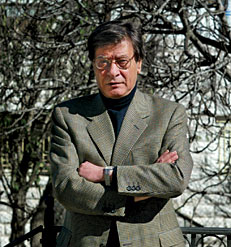 |
| OSAMA SILWADI / APOLLO IMAGES / POLARIS |
| Mahmoud Darwish, 1942–2008, photographed in Ramallah, 2006 |
by Fady Joudah
My relationship with Mahmoud Darwish began when I was seven years old, in Libya, memorizing his poems for small change my father or uncle would hand me after a correct recitation. Later, when I returned to the United States for college, I pulled out of the deep well in my mind the poetry that had introduced me to the lyric world. Stunned by Darwish’s absence in English translation, I was determined that one day I would help establish him for who he was: Not just the “national poet of Palestine,” or even an “Arab poet,” but a world poet—a universal, timeless voice.
In 2004, I phoned him to tell him about my plans for translation. I remember what he said: “Translation is anyone’s right.” Our relationship continued that way, by telephone, until I met him in the last week of his life for a long, beautiful afternoon in Houston. Despite his fame, he was a shy, even transparent man, like one of the almond blossoms that bloom in March, the month of his birth in the Galilee he loved so much.
His life paralleled that of the post–World War II Palestinian collective: Displacement, dispossession, liberation, occupation, despair and hope were the themes he lived. His mother’s coffee, which he longed for in his famous poem To My Mother, written from an Israeli jail while he was in his 20’s, became the metaphorical coffee of thousands. Similarly, his ruined hometown, forever present and absent, has become the hometown of millions of refugees, exiles and displaced people around the world. Whenever he wrote his most personal feelings, they echoed in the plural.
He realized that Palestine was a metaphor for a larger state of exile which transcends boundaries, ethnicities and histories. In his later years he developed this sensibility to encompass the specificity of dialogue between the Self (the “I”) and its Others, but, unlike many “nationalist” poets, Darwish never shied from including Others—especially Jews and Israelis—in love and in dialogue, in reproach and in truthfulness.
Mahmoud Darwish was as particularly Galilean as he was a citizen of this Earth. He was one of the rare, timeless voices that spoke and sang for the better traits of humanity. He always aimed at countering the dark, wherever it might be, whichever name it might bear. By eulogizing life, he immortalized his own.
| Fady Joudah is a Palestinian–American physician with field experience with Doctors Without Borders in 2002 and 2005. His poetry collection, The Earth in the Attic, won the Yale Series of Younger Poets competition in 2007. In 2008, his translation of Mahmoud Darwish’s The Butterfly’s Burden was short-listed for PEN’s award for poetry in translation, and won the Saif Ghobash Banipal prize for Arabic translation by the Society of Authors in the UK. He lives in Houston. |